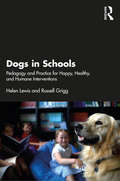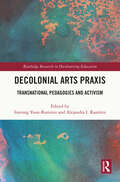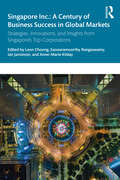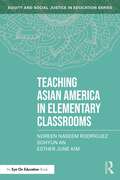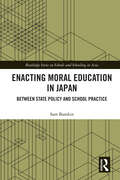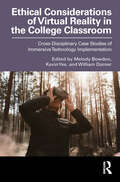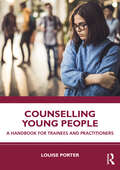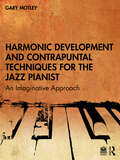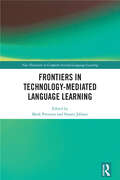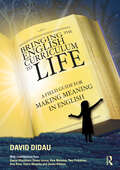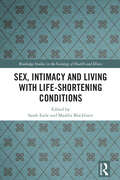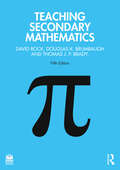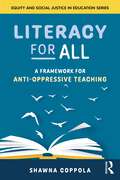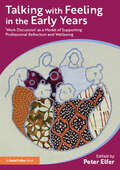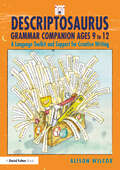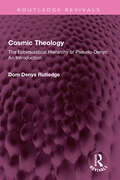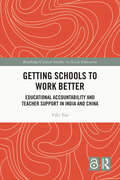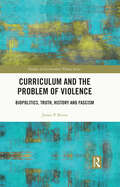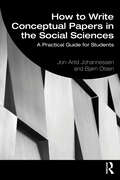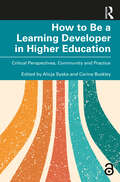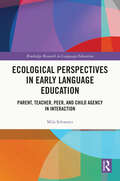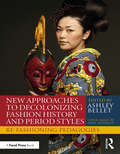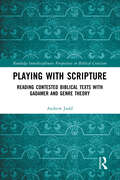- Table View
- List View
Dogs in Schools: Pedagogy and Practice for Happy, Healthy, and Humane Interventions
by Helen Lewis Russell GriggUsing a wealth of infographics and classroom examples, Dogs in Schools sets out the pedagogical principles that schools can employ to work with school dogs in a way that promotes the well-being of all participants and creates a safe environment for all. This is the first book to combine theory and research with the views of experienced teachers and professionals working around the world, from the United Kingdom to India, from Australia to mainland Europe. Their perspectives illustrate the wide-ranging interest in school dogs but also highlight common concerns. For policymakers, this is a book not to ignore because it shows how dogs have the potential to make a significant contribution to children's well-being at a time of growing concern in this area. Simultaneously, the authors endorse the views of contributors who call for the introduction of humane regulations and fulsome guidance so that school dogs are viewed as sentient companions and not relegated to the latest educational fad. This is a must-read book for all those who are serious about humane education and ensuring the well-being and happiness of both children and dogs.
Dogs in Schools: Pedagogy and Practice for Happy, Healthy, and Humane Interventions
by Helen Lewis Russell GriggUsing a wealth of infographics and classroom examples, Dogs in Schools sets out the pedagogical principles that schools can employ to work with school dogs in a way that promotes the well-being of all participants and creates a safe environment for all.This is the first book to combine theory and research with the views of experienced teachers and professionals working around the world, from the United Kingdom to India, from Australia to mainland Europe. Their perspectives illustrate the wide-ranging interest in school dogs but also highlight common concerns. For policymakers, this is a book not to ignore because it shows how dogs have the potential to make a significant contribution to children's well-being at a time of growing concern in this area. Simultaneously, the authors endorse the views of contributors who call for the introduction of humane regulations and fulsome guidance so that school dogs are viewed as sentient companions and not relegated to the latest educational fad.This is a must-read book for all those who are serious about humane education and ensuring the well-being and happiness of both children and dogs.
Decolonial Arts Praxis: Transnational Pedagogies and Activism (Routledge Research in Decolonizing Education)
by Injeong Yoon-Ramirez Alejandra I. RamírezDecolonial Arts Praxis: Transnational Pedagogies and Activism illustrates the productive potential of critical arts pedagogies in the ongoing work of decolonization by engaging art, activism, and transnational feminisms. Offering contributions from scholars, educators, artists, and activists from varied disciplines, the volume highlights how arts can reveal intersectional forms of oppression, inform critical understandings, and rebuild transnational solidarities across geopolitical borders. The contributors present forms of enquiry, creative writing, art, and reflection which grapple with issues of colonialism, racism, and epistemological violence to illustrate the power of decolonial arts pedagogies in formal and informal education. Using a range of multiple and intersectional critical lenses, through which readers can examine ways in which transnational feminist theorizing and art pedagogy inform, shape, and help strategize activism in various spaces, it will appeal to scholars, postgraduate students, and practitioners with interests in arts education, the sociology of education, postcolonialism, and multicultural education.
Singapore Inc.: Strategies, Innovations, and Insights from Singapore's Top Corporations
by Leon Choong Easwaramoorthy Rangaswamy Ian Jamieson Anne-Marie KildayThis book features 100 local case studies examining the experiences of leading Singaporean companies across different sectors including aviation, logistics, banking, and real estate. They offer valuable insights into how companies adapted to evolving market dynamics, expanded their business portfolios, ventured into global markets, prioritised sustainability, and leveraged innovation and technology to maintain competitiveness. Through case studies, readers gain practical knowledge that can be applied to their own enterprises, a unique perspective into Singapore’s dynamic and competitive business landscape, and the successes and challenges faced by Singaporean companies. The book is divided into different sections exploring specific themes such as business strategy and transformation, diversification and expansion, sustainability, innovation and technology, financial performance, and risk management. It scrutinises how companies responded to shifting market conditions, competition, regulations, customer preferences, and global events. Additionally, it sheds light on the obstacles companies encountered in terms of sustainable practices, financial performance, risk management, talent retention, and technological advancements. By presenting cases across industries and companies in Singapore, Choong et al. highlight their triumphs, setbacks, and valuable lessons learned. This book can be rendered as a practical and essential resource for business professionals, entrepreneurs, and students interested in understanding effective business strategies.
Teaching Asian America in Elementary Classrooms (Equity and Social Justice in Education Series)
by Noreen Naseem Rodríguez Soyhun An Esther June KimAsian American voices and experiences are largely absent from elementary curricula. Asian Americans are an extraordinarily diverse group of people, yet are often viewed through stereotypical lenses: as Chinese or Japanese only, as recent immigrants who do not speak English, as exotic foreigners, or as a “model minority” who do well in school. This fundamental misperception of who Asian Americans are begins with young learners―often from what they learn, or do not learn, in school. This book sets out to amend the superficial treatment of Asian American histories in U.S. textbooks and curriculum by providing elementary teachers with a more nuanced, thematically driven account. In chapters focusing on the complexity of Asian American identity, major moments in Asian immigration, war and displacement, issues of citizenship, and Asian American activism, the authors include suggestions across content areas for guided class discussions, ideas for broader units, and recommendations for children’s literature as well as primary sources.
Enacting Moral Education in Japan: Between State Policy and School Practice (Routledge Series on Schools and Schooling in Asia)
by Sam BamkinDrawing on the case of moral education reform, this book provides an authoritative picture of how policy is enacted between state policymaking and school practice in Japan, focusing on how national policy is enacted locally in the classroom. The study follows the 2015 moral education reform from its genesis in central government, through the Ministry of Education to its enactment by local government and schools. The book looks beyond written policies, curricula and textbooks to examine how teachers, school administrators and others make sense of, and translate, policy into practice in the Japanese classroom context. Chapters explore how moral education practice has changed in response to the intentions of national policy, and analyzes the implications for understanding processes of policy enactment in the Japanese education system. This book presents a new perspective on the complexity of education policy making, practice, and the gaps in between. It will be of interest to postgraduate students, researchers, and academics in the fields of education policy and politics, moral education, school administration, and international and comparative education more broadly, particularly in Asia.
Ethical Considerations of Virtual Reality in the College Classroom: Cross-Disciplinary Case Studies of Immersive Technology Implementation
by Melody Bowdon Kevin Yee William DornerEthical Considerations of Virtual Reality in the College Classroom collects case studies that address both pedagogical and ethical foundations of extended reality tools in postsecondary learning environments across disciplines. With today’s institutional programs and faculty leveraging cutting-edge virtual, augmented, and mixed reality opportunities to teach and promote achievement goals, it is imperative that new research into these technologies speaks directly to their challenges and affordances within broad academic settings. This book showcases real-world examples of faculty members who chronicle and develop their use of VR tools across learning contexts and student populations by creating their own digital experiences, adapting open-source tools, integrating commercial products, amplifying crucial course content, analyzing outcomes data, and more. Nontechnical readers will come away with a new understanding of key terms and concepts associated with virtual reality and essential heuristics for evaluating the ethical implications of immersive approaches.
Counselling Young People: A Handbook for Trainees and Practitioners
by Louise PorterPractical and clearly written, this new book from best-selling author Louise Porter equips mental health professionals with the knowledge and skills they need to provide insightful guidance and support to children and adolescents. The book introduces exciting new models for thinking about young people’s needs, self-esteem and resilience that will invigorate counselling. It outlines the most common presenting difficulties for young people and provides clear, practical guidance on how professionals in a counselling environment can respond to these in an effective way. Offering a coherent blend of theories and practices, chapters address a wide range of emotional, social, behavioural and learning difficulties with which young people may present to counselling, such as experiences of grief and loss, anxiety and depression, disordered eating, and dealing with adversity. With an aim to empower, the book presents a non-pathologising approach to counselling that respects the skills that young people bring to working through their challenges. Accessible for professionals and trainees alike, this book is a must-have for anyone working in a counselling capacity with children and adolescents.
Harmonic Development and Contrapuntal Techniques for the Jazz Pianist: An Imaginative Approach
by Gary MotleyHarmonic Development and Contrapuntal Techniques for the Jazz Pianist serves as a guide for harmonic expansion and development for jazz piano, offering pianists both a rationale and methods to improve contrapuntal hand techniques. The text focuses on the relationship between theory and execution and both of those components’ usefulness in creating a jazz sound at the piano. This kinaesthetic method provides the learner with a systematic approach to harmonic movement, revealing options that may not have been otherwise apparent. This method will allow pianists to add depth and dimension to their chord voicings in the same way that vocalists and wind instrumentalists give character and shape to the notes they create. Key features include musical examples ranging from singular chord construction to sophisticated harmonic progressions and song application. Performance exercises are provided throughout the text. Learners and instructors are encouraged to create their own exercises. Related ancillaries at harmoniccounterpoint.com include: Musical examples Audio tracks Performance exercises Written assignments Intended for the learner who is reasonably familiar with essential jazz harmony, this textbook will be both a significant resource for the advanced player and a fundamental component for the learner in a structured academic musical setting.
Frontiers in Technology-Mediated Language Learning (New Directions in Computer Assisted Language Learning)
by Mark Peterson Nasser JabbariIn the context of continuing technological innovation, the field of technology-mediated foreign language learning is expanding rapidly. Advances in digital technologies are providing researchers with opportunities to investigate a range of exciting new areas of research. This edited volume is designed to showcase a selection of recent cutting-edge innovations. This publication incorporates chapters dealing with the use virtual reality, social networking, speech technologies and social semiotics. Also included are chapters that focus on the relevant review work that is vital for progress in the field. This publication provides an indispensable guide to a wide range of practitioners, including language educators, researchers, graduate students, learning scientists and instructional designers.
Bringing the English Curriculum to Life: A Field Guide for Making Meaning in English
by David DidauBringing the English Curriculum to Life builds on David Didau’s groundbreaking book Making Meaning in English by showing how the principles of the original book can be applied in schools and classrooms. Drawing together experiences of designing, teaching, supporting and assessing English across the schools within Ormiston Academies Trust (OAT), this book demonstrates what an ambitious, coherently sequenced, broad and balanced English curriculum with successful adaption for students with SEND can look like in practice.Designed around the explicit teaching of the powerful conceptual knowledge students need to master the discipline, the book offers a fully resourced English curriculum packed with teaching suggestions and examples of high-quality practice. Covering intent, implementation and assessment, and outlining in detail what is included in each module for KS3 and 4, the curriculum can be adopted in its entirety, but is also flexible enough for departments to take modules and slot them into their own curriculum.Providing an inspiring model for teaching English that enables all students to succeed, this is an essential resource for all English teachers and school leaders responsible for curriculum development.
Sex, Intimacy and Living with Life-Shortening Conditions
by Sarah Earle Maddie BlackburnThis multi-disciplinary and inclusive collection brings together theoretically informed and empirically focused research on sex, intimacy and reproduction in relation to young people and adults with life-shortening conditions. Advances in healthcare mean that increasing numbers of young people with life-shortening conditions are transitioning into adulthood. Issues such as sex and intimacy, dating and relationships, fertility and having children are increasingly relevant to them and to the people that support them, including families, carers, practitioners and professional education, health and social care agencies. This three-part book explores the relevance and significance of this field, examines everyday experiences, and highlights the challenges faced by individuals and organisations in addressing the needs of such people in daily life and in the context of practice. Drawing on perspectives from sociology, disability studies, epidemiology, health policy, psychotherapy, legal studies, queer studies and nursing, this ground-breaking volume is written by academics, policy makers, practitioners and experts by experience. It is an essential read for all those practising and researching in the fields of sexuality, chronic illness and disability and transition.
Teaching Secondary Mathematics
by David Rock Douglas K. Brumbaugh Thomas J. BradySolidly grounded in up-to-date research, theory, and technology, Teaching Secondary Mathematics is a practical, student-friendly, and popular text for secondary mathematics methods courses. It provides clear and useful approaches for mathematics teachers and shows how concepts typically found in a secondary mathematics curriculum can be taught in a positive and encouraging way. The thoroughly revised fifth edition combines this pragmatic approach with truly innovative and integrated technology content throughout. Synthesized content between the book and a comprehensive Instructor and Student Resource website offers expanded discussion of chapter topics, additional examples, and technological tips, such as using and assessing artificial intelligence.Each chapter features tried-and-tested pedagogical techniques, problem-solving challenges, discussion points, activities, mathematical challenges, and student-life-based applications that will encourage students to think and do.New to the fifth edition: A fully revised chapter on technological advancements in the teaching of mathematics, including the use of artificial intelligence A new chapter on equity, shame, and anxiety in the mathematics classroom Connections to both the updated National Council of Teachers of Mathematics (NCTM) Focal Points and Standards Problem-solving challenges and sticky questions featured in each chapter to encourage students to think through everyday issues and possible solutions A fresh interior design to better highlight pedagogical elements and key features A completely updated Instructor and Student Resource site with chapter-by-chapter video lessons, teacher tools, problem solving Q&As, exercises, and helpful links and resources.
Literacy for All: A Framework for Anti-Oppressive Teaching (Equity and Social Justice in Education Series #0)
by Shawna CoppolaAn equity-conscious, culturally sustaining approach to literacy education. Every student comes to the classroom with unique funds of knowledge in addition to unique needs. How can teachers celebrate and draw upon the valuable literacies each child already possesses to engage them more effectively in school literacy practices? In Literacy for All, Shawna Coppola shows how a literacy pedagogy founded on anti-oppressive principles can transform the experiences of teachers and students alike. Using her framework, which highlights the social and cultural aspects of literacy, teachers can help students participate in literacy experiences that illuminate their individual strengths. Coppola’s book, an ideal introduction for equity-conscious literacy educators, shows how to design instructional and assessment practices that reflect both the cognitive processes and the social practices inherent in learning to read and write.
Talking with Feeling in the Early Years: ‘Work Discussion’ as a Model of Supporting Professional Reflection and Wellbeing
by Peter ElferEarly years pedagogy is a deeply human, emotional activity as well as an intellectual and physical one. Drawing on key research, this book explores how ‘Work Discussion’ can offer a safe space for practitioners to reflect on their daily experience including the feelings that accompany the work. In facilitating honest and open conversations, it shows how sharing troubling dilemmas and experiences in a supportive environment can improve both the wellbeing of practitioners and the outcomes for children and their families. This book explains the origins of Work Discussion, the results of a year-long evaluation of its impact in a large early years setting, and the accounts of five nursery leaders who have experienced using Work Discussion. Concluding with practical advice on preparing to go forward for training in facilitating Work Discussion groups in early years settings, chapters cover: How to set up Work Discussion as a model of professional reflection Structuring conversations and responding to difficult incidents and experiences The benefits of Work Discussion for practitioners, children and families Detailed case studies of Work Discussion in action. Written by leading experts and including reflective questions throughout, this will be valuable reading for early years practitioners as well as managers wanting to support their staff’s mental health wellbeing.
Descriptosaurus Grammar Companion Ages 9 to 12: A Language Toolkit and Support for Creative Writing
by Alison WilcoxDescriptosaurus Grammar Companion Ages 9 to 12 is a flexible grammar toolkit based on current research about effective strategies for teaching grammar tools and sentence construction (investigation, imitation, combining and expansion). It includes guidelines, exercises, scaffolds and models, and by showing a clear progression route to the acquisition and consolidation of increasingly more complex grammar tools it provides teachers and students with a road map that makes learning about sentence construction and revision visible. This book is a collection of connected resources that can be used as and when required and it provides an easily accessible differentiation resource for each student based on their current stage of development, not the age-related targets and expectations. It enables the learning process for grammar tools to be recursive rather than linear; to be regularly revisited in short bursts to consolidate students’ knowledge and usage, or to correct any misconceptions or problem areas without impeding any writing activities already planned. Chapters focus on four main points: Investigation Imitation Combining Expansion This Grammar Companion supports the main Descriptosaurus book and scaffolds students in their journey through the world of language. This essential resource will strengthen their language muscles and build confidence with sentence manipulation when revising their own texts, thus freeing their minds to think about the important issues of writing: content, audience and purpose, and organisation and structure.
Cosmic Theology: The Ecclesiastical Hierarchy of Pseudo-Denys: An Introduction (Routledge Revivals)
by Dom Denys RutledgeFirst published in 1964, Cosmic Theology introduces a work, little known to English readers, which has influenced theological and mystical writing for at least fourteen hundred years. It is, in effect, a synthesis of Christian teaching, particularly on the nature of the Church, in which science and religion, the other world and the values of the present world may be seen in their source and original harmony. Written before the division between Greek and Latin Churches, and later between Catholic and Protestant, it affords a convenient point from which to view later speculation and controversy in its true perspectives. Apart from helping those interested in the ecumenical movement and in the current liturgical revival, this work will serve as a bridge to the understanding of Eastern, and particularly Hindu, religion.
Getting Schools to Work Better: Educational Accountability and Teacher Support in India and China (Routledge Critical Studies in Asian Education)
by Yifei YanYifei Yan’s ambitious multi-method case study of government middle schools in Beijing and Delhi provides fresh insights into how educational accountability can be designed to work, in part and as a whole.Getting schools to work better is a challenge just about everywhere. Many policy experts prescribe measures for strengthening school accountability, either through government command and control or through alternative market and societal actors. In challenging this conventional wisdom, this book examines how China and India are tackling the challenge with a specific focus on supporting teachers along with traditional accountability-strengthening measures. The book draws implications from its case studies for how education systems can be designed towards the fulfilment of Sustainable Development Goal 4. It further develops the concept of "Accountability 3.0" to elucidate a novel and more holistic reconceptualisation of the appropriate means needed to fulfil multiple purposes of accountability, in which providing support to frontline workers is viewed as an integral component.This book will appeal to a wide spectrum of scholars and practitioners in the fields of comparative education, public administration, public policy and development studies, among others. It will be especially interesting to those from the developing world facing similar accountability challenges as described.
Curriculum and the Problem of Violence: Biopolitics, Truth, History and Fascism (Studies in Curriculum Theory Series)
by James P. BurnsThis book is a genealogical inquiry into the present problem of violence, in the US and internationally, through the lens of curriculum theory. It explores a constellation of problems including war, authoritarianism, post-truth, social disparities, and increasingly onerous surveillance technologies. Arguing that the current problem of violence is neither new, nor aberrant, the author historicises the conditions of possibility that have produced the violence that presently confronts our world. Seemingly disparate issues such as ethnonationalism, authoritarian populism, Christian nationalism, neoliberalism, the proliferation of sophisticated surveillance technologies, and military Keynesianism are traced to historical features such as ‘Ur-Fascism,’ white supremacy, corporate capitalism, religious extremism, propaganda and public relations, institutional power, and the biopolitical ‘death function’ endemic in modern societies. Through a sweeping, powerful, and in-depth analysis of violence in its genealogical trajectories in global setting, it promises to re-examine curriculum in a different light and open up new possibilities. As such, the book is an important curriculum study which supports curricular ethics as articulated by Bill Pinar, such as the situation of the self socially and historically, the reconstruction of one’s understanding of the self and the world, and the potential reconstruction of the social world as more peaceful and just. Significantly, the book contributes to a retheorisation of Foucault’s biopolitics as affirmative biopower imbued with ethics of truth-seeking as a technology of the self. It will appeal to scholars and students of curriculum studies with interests in curriculum theory, authoritarianism, non-violence studies, justice studies, ethnonationalism and technologies of the self.
How to Write Conceptual Papers in the Social Sciences: A Practical Guide for Students
by Jon-Arild Johannessen Bjørn OlsenThis book is a practical guide on how to write conceptual papers and use conceptual generalization as a research methodology. Divided into two parts, the book first focuses on the scientific foundation for conceptual generalization, to identify what is a conceptual model and how conceptual models can be developed. Part two focuses on how to write a winning conceptual thesis, covering conceptual generalisation and empirical generalisation, and discusses research problems and questions, and how to analyse them. The authors cover different conceptual and analytical models to offer students a multitude of tools to visualize, interpret and uncover relationships and patterns. For example, they explore the thought experiment, analytical models, empirical causal models, analytical forms and data mining models, and outline a strategy for developing conceptual models to assist with students who wish to design their own conceptual paper. Students gain a clear understanding of the driving forces in the research process, how to define a research problem, how to analysis the problem and develop research strategies. Moving from concepts to hypotheses, the book also covers the main types of errors that may be encountered as students learn about understanding the development of models and how to develop a theory. Also including a checklist for students, and a list of definitions and concepts, this is the ideal resource for advanced undergraduate and postgraduate students, and researchers, in the social sciences.
How to Be a Learning Developer in Higher Education: Critical Perspectives, Community and Practice
by Alicja Syska Carina BuckleyFilled with practical guidance for those working in and interested in the emergent field of Learning Development, this must-read book encapsulates what it means to be a Learning Developer and how to thrive in this role. With carefully constructed contributions which explore different aspects of the role, this edited collection is comprehensive in its approach. Alongside practical advice, it is underpinned by theoretical and epistemological insights to provide a bridge between theory and practice. Organised into five key parts, it is arranged in a way that reflects the journey that practitioners take into and through Learning Development, from their initiation into the field, through professional development, to becoming an established expert. It covers key topics such as: the basic principles of working in Learning Development the theoretical and practical foundations of the field how to engage more critically with the role how to become an active contributor to the field through research and publication the as-yet unrealised possibilities of Learning Development Capturing a diverse array of voices, experiences, and perspectives, this book is an essential guide for both new and established practitioners concerned with student Learning and Development.
Ecological Perspectives in Early Language Education: Parent, Teacher, Peer, and Child Agency in Interaction (Routledge Research in Language Education)
by Mila SchwartzThis book presents ecological perspectives towards early language education that conceptualise the phenomenon of interactions between child language-based agency, teachers’ agency, peers’ agency and parents’ agency, consequently furthering insights into the lives of young children growing up in multilingual homes.Drawing on rich empirical research evidence, the book explores teachers’ and family strategies and practices aimed at enhancing children’s interest in home language maintenance and enrichment as well as in the novel language learning. It defines early language education as the education of children up to the age of 6 and considers international evidence of children’s language from diverse sociolinguistic backgrounds and indigenous, endangered, heritage, regional, minority, majority, and marginalized languages, as well as foreign and second languages in education at home and out-of-home settings. It claims that only through collaboration between teachers, families, peers, and close environment, can the child be engaged in early language learning and fully experience his or her potential to act as agent in a novel language learning.The book will be of great interest to researchers, academics, and postgraduate students in the fields of language education, multilingualism, applied linguistics, and early childhood education. Practitioners in these fields may also find the volume a valuable resource.
New Approaches to Decolonizing Fashion History and Period Styles: Re-Fashioning Pedagogies
by Ashley BelletNew Approaches to Decolonizing Fashion History and Period Styles: Re-Fashioning Pedagogies offers a wide array of inclusive, global, practical approaches for teaching costume and fashion history. Costume designers, technicians, and historians have spent the last several years re-evaluating how they teach costume and fashion history, acknowledging the need to refocus the discourse to include a more global perspective. This book is a collection of pedagogical methods aimed to do just that, with an emphasis on easy reference, accessible activities, and rubrics, and containing a variety of ways to restructure the course. Each chapter offers a course description, syllabus calendar, course objectives, and learning outcomes, as well as sample activities from instructors across the country who have made major changes to their coursework. Using a combination of personal narratives, examples from their work, bibliographies of helpful texts, and student responses, contributors suggest a variety of ways to decolonize the traditionally Western-focused fashion history syllabus. This collection of pedagogical approaches is intended to support and inspire instructors teaching costume design, costume history, fashion history, period styles, and other aesthetic histories in the arts.
New Approaches to Decolonizing Fashion History and Period Styles: Re-Fashioning Pedagogies
by Ashley BelletNew Approaches to Decolonizing Fashion History and Period Styles: Re-Fashioning Pedagogies offers a wide array of inclusive, global, practical approaches for teaching costume and fashion history.Costume designers, technicians, and historians have spent the last several years re-evaluating how they teach costume and fashion history, acknowledging the need to refocus the discourse to include a more global perspective. This book is a collection of pedagogical methods aimed to do just that, with an emphasis on easy reference, accessible activities, and rubrics, and containing a variety of ways to restructure the course. Each chapter offers a course description, syllabus calendar, course objectives, and learning outcomes, as well as sample activities from instructors across the country who have made major changes to their coursework. Using a combination of personal narratives, examples from their work, bibliographies of helpful texts, and student responses, contributors suggest a variety of ways to decolonize the traditionally Western-focused fashion history syllabus.This collection of pedagogical approaches is intended to support and inspire instructors teaching costume design, costume history, fashion history, period styles, and other aesthetic histories in the arts.
Playing with Scripture: Reading Contested Biblical Texts with Gadamer and Genre Theory (Routledge Interdisciplinary Perspectives on Biblical Criticism)
by Andrew JuddThis book puts a creative new reading of Hans-Georg Gadamer’s philosophical hermeneutics and literary genre theory to work on the problem of Scripture. Reading texts as Scripture brings two hermeneutical assumptions into tension: that the text will continually say something new and relevant to the present situation, and that the text has stability and authority over readers. Given how contested the Bible’s meaning is, how is it possible to ‘read Scripture’ as authoritative and relevant? Rather than anchor meaning in author, text or reader, Gadamer’s phenomenological model of hermeneutical experience as Spiel (‘play’) offers a dynamic, intersubjective account of how understanding happens, avoiding the dead end of the subjective–objective dichotomy. Modern genre theory addresses some of the criticisms of Gadamer, accounting for the different roles played by readers in different genres using the new term Lesespiel (‘reading game’). This is tested in three case studies of contested texts: the recontextualization of psalms in the book of Acts, the use of Hagar’s story (Genesis 16) in nineteenth-century debates over slavery and the troubling reception history of the rape and murder in Gibeah (Judges 19). In each study, the application of ancient text to contemporary situation is neither arbitrary, nor slavishly bound to tradition, but playful.
